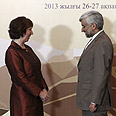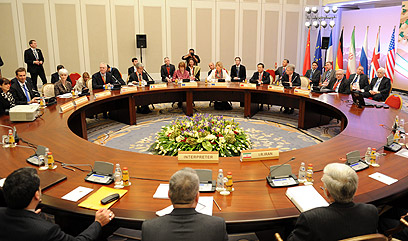
No deal in sight on final day of Iran nuclear talks
Iran, world powers enter second day of talks in Almaty after Tehran sidestepped sanctions offer with puzzling proposal of its own
World powers and Iran began the second day of nuclear talks on Saturday with little hope of striking a breakthrough deal in the decade-old dispute that threatens to erupt into a new Middle East war.
Negotiators failed to narrow their differences when the two-day meeting began on Friday, which followed a round of talks in February, also in Kazakhstan's commercial hub, Almaty.
Related stories:
- World powers seek 'clear and concrete' response from Iran
- Iran's nuclear quest 'has cost Tehran over $100 billion'
- Op-ed: Wasting time in Kazakhstan
The final day of negotiations is unlikely to achieve more than a willingness to keep talking, after Iran responded on Friday to a limited offer to ease sanctions with a proposal of its own that puzzled Western diplomats and which Russia said raised more questions than answers.

Nuclear talks in Kazakhstan (Photo: EPA)
Iran's critics, which accuse it of seeking nuclear weapons capability, have accused Tehran in the past of using diplomacy as a stalling tactic and the latest inconclusive talks are unlikely to reassure Israel, which says it could launch air strikes to stop Iran getting the bomb, if necessary.
Acording to international estimates, Israel is widely believed to have the Middle East's only nuclear arsenal.
With all sides aware that a breakdown in diplomacy could move the standoff a step closer to war, no one in Almaty was talking about abandoning diplomatic efforts. But an actual deal seemed as far away as ever.
"We had a substantive exchange. But there is still a wide gulf between the parties. We are considering how we move on from here," said one Western diplomat after five hours of talks on Friday.
On Saturday morning, European Union foreign policy chief Catherine Ashton - the six world powers' lead negotiator - held a bilateral meeting with her Iranian counterpart, an official involved in the talks said.
Chinese and French diplomats also met bilaterally with the Iranian delegation before the wider negotiations resumed around noon (0600 GMT), the official added.
With a presidential election due in Iran in June, hopes for a breakthrough were slim even before the first day of talks when Iran declined to accept or reject an offer of modest sanctions relief in exchange for curbing its most sensitive nuclear work.
Iran's deputy negotiator Ali Bagheri said Iran had given a "detailed response to all the questions".
Russian Deputy Foreign Minister Sergei Ryabkov said: "Iran has given an answer to the proposals of the six powers. It is the kind of answer that creates more questions ... But this shows that the negotiations are serious."
Failed Round
Without substantial progress in coming months, Western governments are likely to impose new economic sanctions on Iran.
"It seems that instead of narrowing, the gap between the sides actually widened," said Ali Vaez, an Iran expert with the International Crisis Group.
In their second meeting with Iranian negotiators in Almaty this year, the six nations - the United States, Russia, China, France, Britain and Germany - tried on Friday to persuade Iran to abandon its higher-grade uranium enrichment, as a first step to a broader agreement.
But deputy negotiator Bagheri indicated that Iran wanted to know how and when its main concerns would be addressed before it agreed to any intermediate steps.
Iran, which denies seeking nuclear weapons, wants major economic sanctions - including on its oil exports and banks - lifted and its right to enrich uranium publicly recognized.
The six nations, however, say this right only applies when nuclear work is carried out under sufficient oversight by UN inspectors, something Iran has refused to grant.
Since 2006, the UN Security Council has demanded that Iran stop the process.
The powers said in February that they wanted Iran to convince them it was serious about a final deal by stopping enrichment of uranium to 20 percent, an important technological advance en route to producing weapons-grade material, ship out some stockpiles and shutter a facility where such work is done.
In return they offered relief on sanctions on Iranian petrochemicals and trade in gold and other precious metals.
- Receive Ynetnews updates directly to your desktop










